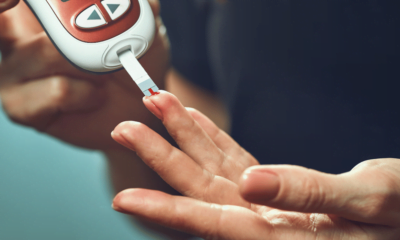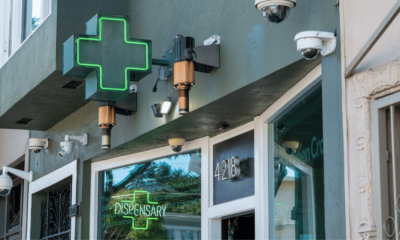Safety and quality control sets prescribed cannabis apart from its illegal counterpart, says experienced horticulturist and head grower at Dalgety, Brady Green.
Here, he discusses the difference between illegally cultivated and distributed cannabis and regulated, pharmaceutical-grade medicinal products.
According to ONS figures, 7.4% of 16- to 24-year-olds and 16.2% of 16- to 59-year-olds, reported having used illegal recreational cannabis in the last year. This use continues to create a negative stigma around a product that, when cultivated in a controlled and regulated way, has the potential to change the landscape of chronic pain management in the UK.
Medicinal producers are now pushing for a broad understanding of their separation from the illegal market, where recreational users consume a product that is unregulated, unaware of how it has been grown, what has been added to it, or what the effects, positive or otherwise, will be.
This is leagues away from the stringent processes and regulations around the cultivation of pharmaceutical-grade cannabis, which is prescribed for specific medicinal reasons. It is vital that we, the legal medicinal cannabis industry, raise awareness of these differences and remain clear on the very different illegal and legal markets.
The pharmaceutical cultivation process – pesticide and chemical free
The starkest difference is the cultivation process. Much like growing any crop, the use of pesticides and chemicals will improve yield. In the UK, there are strict regulations on the use of these substances, to not only protect the plants and vegetation for human consumption, but also deliver benefits to the environment and wildlife.
In illegal cannabis cultivation, there is nothing to stop the use of chemicals, including plant growth regulators, as well as dangerous pesticides to prevent pests, mildew, mould and root disease. While these may enhance the growth of the plant, once cropped and distributed to be consumed, often through smoking, users will be breathing in extremely dangerous carcinogens as well as hydrogen cyanide. These can produce ill-effects on the body and respiratory system.
However, in medicinal cannabis production, cultivators abide by strictly regulated inputs and biological controls for pests, with tight restrictions to ensure the product is medical-grade quality and safe for consumption.
What is often implemented on the black market to reduce pest pressure, to enhance flavour or aroma and produce a higher density of buds and flowers, is all done without harmful chemicals in the medicinal trade.
Expert knowledge and advanced facilities
Experienced medicinal cannabis growers are essential to high quality and consistent production, due to the specific nature of the process. At Dalgety, we bring together industry leaders, regulatory specialists and world leading experts in biochemistry and horticulture to maximise our standards and refine our processes. This coupled with advanced growing facilities and technology is another element of what raises the bar for medicinal cannabis.
Illegal cannabis setups in the UK are often in spaces, naturally, that are easily hidden rather than prioritising the quality and safety of the product. This can mean sources of electricity, light, air and water are limited as well as being completely exposed to risks.
At the forefront of medicinal cannabis are the top-level facilities that are used to house and monitor the plants. Some producers use labs, others use greenhouses, but each is a tightly controlled environment that ensures plants can thrive. Technology is also used through the many systems in place, playing a huge role in collecting growth data and graphing the results to help control the space across the year. Growers also use this information to ensure conditions are optimal, rather than leaving it to chance, especially as margins are so tight.
While the black market will adopt a certain level of technology and monitor growth, this will not be to the same level, and is likely to produce inaccurate or inconsistent results. What this leads to is a mixed product, with less certainty of the effects for users.
Regulations and consistency
Medicinal cannabis products were legalised in the UK in 2018, making them available on prescription, commonly via private doctors and specialist clinics. Currently, the UK imports the majority of its cannabis-based medicines, with a drive to grant licenses that will allow in-country sourcing for improved quality control and traceability.
Achieving a license granted by the Home Office is only done through meeting strict requirements and being inspected by the UK Medicines and Healthcare products Regulatory Agency (MHRA). This includes regular inspections of the growing facilities and quality controls, as well as many other elements that form an audit of the operation.
Once this license has been granted, UK medicinal cannabis producers must then continue to meet standards, which is why keeping data is hugely important to track the processes. This also means for consumers, there is transparency about the product. In the medicinal industry, products need to be consistent, and this means keeping ingredients and conditions the same throughout, so that buyers know what they are getting.
This is not about gut feelings of what is and isn’t a good product to consume, as might be the case on the black market. Meeting these requirements is critical to ensuring that medicinal cannabis continues to perform as intended, as a safe and high-quality product.
Dalgety successfully gained its license from the Home Office earlier this year, allowing the business to cultivate and manufacture EU-GMP grade high THC-medicinal cannabis from its state-of-the-art UK-based facility. As more growers come on board, facilitated through the granting of government licenses, the medicinal cannabis industry will continue to grow and with it, help the deplete the chances of users heading to costly, illegal and dangerous black market alternatives.

Brady Green, head grower at Dalgety.
Brady Green is the head grower at Dalgety, where he oversees its state-of-the-art hydroponic growing facility. Originally from Canada, Brady has been at the forefront of an established cannabis market, with Canada being the first country to offer an access programme in 1999. Brady has more than ten years of experience in horticulture and cultivating new cannabis strains and has a passion for improving growing methods and efficiencies.
For further information visit www.DalgetyUK.co.uk or email info@DalgetyUK.co.uk.
Home » Comment » OPINION: Legal v legacy cannabis – how illegal use continues to impact the medical market

 Science5 months ago
Science5 months ago
 Industry6 months ago
Industry6 months ago
 News5 months ago
News5 months ago
 News6 months ago
News6 months ago
 Health5 months ago
Health5 months ago
 Health3 months ago
Health3 months ago
 Science5 months ago
Science5 months ago
 Cannabis explained5 months ago
Cannabis explained5 months ago













